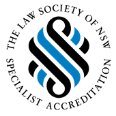Best Brokerage Lawyers in Parramatta
Share your needs with us, get contacted by law firms.
Free. Takes 2 min.
Free Guide to Hiring a Real Estate Lawyer
List of the best lawyers in Parramatta, Australia

About Brokerage Law in Parramatta, Australia:
Brokerage law in Parramatta, Australia deals with the legal regulations surrounding brokerage transactions, including the buying, selling, and leasing of properties. It covers issues such as contract disputes, property rights, landlord-tenant relationships, and more.
Why You May Need a Lawyer:
You may need a lawyer in brokerage when dealing with complex real estate contracts, disputes with landlords or tenants, issues with property titles, or issues related to property transactions that require legal expertise to resolve.
Local Laws Overview:
In Parramatta, Australia, brokerage law is governed by state legislation such as the Property and Stock Agents Act 2002 and the Real Estate & Business Agents Act 1978. These laws outline the rights and responsibilities of brokers, buyers, and sellers in property transactions.
Frequently Asked Questions:
1. What are the requirements to become a licensed real estate agent in Parramatta, Australia?
To become a licensed real estate agent in Parramatta, Australia, you must complete a Certificate of Registration course, gain practical experience, and pass a licensing exam.
2. What are my rights as a tenant in Parramatta, Australia?
Tenants in Parramatta have rights such as the right to a safe and habitable living environment, privacy, and protection against unfair eviction.
3. How can I resolve a dispute with my landlord in Parramatta, Australia?
If you have a dispute with your landlord, you can seek legal advice or mediation services to resolve the issue amicably.
4. Can a broker help me negotiate a better deal when buying a property in Parramatta?
Yes, a broker can assist you in negotiating better terms and conditions when buying a property in Parramatta.
5. What are the common pitfalls to avoid when leasing a property in Parramatta?
Common pitfalls to avoid when leasing a property include not understanding the terms of the lease, not conducting thorough inspections, and not seeking legal advice when needed.
6. How can I verify the legitimacy of a real estate agent in Parramatta?
You can verify the legitimacy of a real estate agent by checking their license credentials on the government website or contacting the relevant regulatory body.
7. What is the process for resolving a breach of contract in a property transaction in Parramatta?
If a breach of contract occurs in a property transaction, parties can seek legal recourse through negotiation, mediation, or litigation in court.
8. Are there specific regulations for commercial real estate transactions in Parramatta?
Yes, commercial real estate transactions are governed by specific regulations in Parramatta, including zoning laws, lease agreements, and tax implications.
9. Can I challenge a property title in Parramatta if I suspect it is inaccurate?
If you suspect inaccuracies in a property title, you can challenge it through legal means by seeking advice from a lawyer or lodging a formal complaint with the relevant authorities.
10. How can I protect my interests as a buyer in a property transaction in Parramatta?
To protect your interests as a buyer, it is recommended to conduct thorough due diligence, review all legal documents carefully, and seek advice from a qualified real estate lawyer.
Additional Resources:
If you need legal assistance in brokerage matters in Parramatta, you can contact the Real Estate Institute of New South Wales or the Legal Aid Commission of New South Wales for guidance and support.
Next Steps:
If you require legal assistance in brokerage in Parramatta, it is advisable to seek advice from a qualified real estate lawyer who can provide tailored solutions to your specific legal issues.
Lawzana helps you find the best lawyers and law firms in Parramatta through a curated and pre-screened list of qualified legal professionals. Our platform offers rankings and detailed profiles of attorneys and law firms, allowing you to compare based on practice areas, including Brokerage, experience, and client feedback.
Each profile includes a description of the firm's areas of practice, client reviews, team members and partners, year of establishment, spoken languages, office locations, contact information, social media presence, and any published articles or resources. Most firms on our platform speak English and are experienced in both local and international legal matters.
Get a quote from top-rated law firms in Parramatta, Australia — quickly, securely, and without unnecessary hassle.
Disclaimer:
The information provided on this page is for general informational purposes only and does not constitute legal advice. While we strive to ensure the accuracy and relevance of the content, legal information may change over time, and interpretations of the law can vary. You should always consult with a qualified legal professional for advice specific to your situation.
We disclaim all liability for actions taken or not taken based on the content of this page. If you believe any information is incorrect or outdated, please contact us, and we will review and update it where appropriate.








